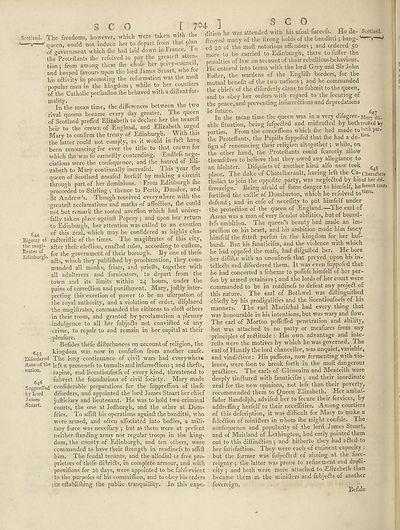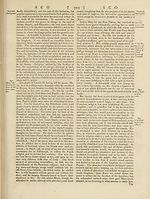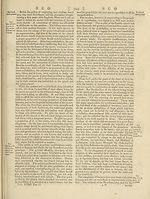Encyclopaedia Britannica, or, a Dictionary of arts, sciences, and miscellaneous literature : enlarged and improved. Illustrated with nearly six hundred engravings > Volume 18, RHI-SCR
(742) Page 704
Download files
Complete book:
Individual page:
Thumbnail gallery: Grid view | List view

SCO [
Scotland. The freedoms, however, which were taken with
queen, could not induce her to depart from that plan
of government which file had laid down in trance. °
the Proteftants {he refolved to pay the greateft atten¬
tion 5 from among them the chofe her privy-council,
and heaped favours upon the lord James Stuart, who mi
his aftivity in promoting the reformation was the molt
popular man in the kingdom ; while to her courtiers
of the Catholic perfuafion the behaved with a diixanttor-
mality. _ .
In the mean time, the differences between the two
rival queens became every day greater. The queen
of Scotland preffed Elizabeth to declare her the neareit
heir to the crown of England, and Elizabeth urged
Mary to confirm the treaty of Edinburgh.^ ^ ith this
the latter could not comply, as it would in fa£t have
been renouncing for ever the title to that crown for
which (lie was fo earneftly contending. Endlefs nego-
ciations were the confequenee, and the hatred of Eli¬
zabeth to Mary continually increafed. This year the
queen of Scotland amufed herfelf by making a circuit
through part of her dominions. From Edinburgh the
proceeded to Stirling •, thence to Perth, Dundee, and
. St Andrew’s. Though received everywhere with the
greateft acclamations and marks of affedtion, Ihe could
not but remark the rooted averfion which had univer-
fally taken place againft Popery } and upon her return
to Edinburgh, her attention was called to an exertion
64(, of this zeal, which may be confidered as highly cha-
Bigotry of ra&eriftic of the times. The magiftrates of this city,
the magi- after their election, enadled rules, according to cuftom,
for the government of their borough. By one of thefe
a£ls, which they publifhed by proclamation, they com¬
manded all monks, friars, and priefts, together with
all adulterers and fornicators, to depart from the
town and its limits within 24 hours, under the
pains of corredlion and puniftunent. Mary, juftly inter¬
preting this exertion of power to be an ufurpation of
the royal authority, and a violation of order, difplaced
the magiftrates, commanded the citizens to eledt others
in their room, and granted by proclamation a plenary
indulgence to all her fubjedfts not convifted of any
crime, to repair to and remain in her capital at their
pleafure.
Befides thefe difturbances on account of religion, the
kingdom was now in confufion from another caufe.
Difordered The long continuance of civil wars had everywhere
Hate of the left a pronenefs to tumults and infurreiftions *, and thefts,
nation. rapine, and lieentioufnefs of every kind, threatened to
, - fubvert the foundations of civil fociety. Mary made
Supprefled confiderable preparations for the fuppreflion of thefe
' T ’ diforders, and appointed the lord James Stuart her chief
jufticiary and lieutenant. He was to hold two criminal
courts, the one at Jedburgh, and the other at Dum¬
fries. To affift his operations againft the banditti, who
were armed, and often aflociated into bodies, a mili¬
tary force was neceffary j but as there were at prefent
neither ftanding army nor regular troops in the king¬
dom, the county of Edinburgh, and ten others, were
commanded to have their ftrength in readinefs to affift;
him. The feudal tenants, and the allodial or free pro¬
prietors of thefe diftri&s, in complete armour, and with
provifions for 20 days, were appointed to be fubfervient
to the purpofes of his commiffion, and to obey his orders
;,n eftabliftung the public tranquillity, .In this expe-
Scotlard.
ftrates of
Edinburgh
by Lord
James
Stuart.
704. 1 SCO
the dition he was attended with his ufual fuccefs. He de-
ftroyed many of the ftrong holds of the banditti ; hang- w
ed 20 of the moft notorious offenders •, and ordered 50
more to be carried to Edinburgh, there to fuffer. the
penalties of law on account of their rebellious behaviour.
He entered into terms with the lord Grey and Sir John
Fofter, the wardens of the Engliffi borders, for the
mutual benefit of the two nations ; and he commanded
the chiefs of the diforderly clans to fubmit to the queen,
and to obey her orders with regard to the fecuring of
the peace, and preventing infurre&ions and depredations
in future. . 647
In the mean time the queen was in a very difagree-Mary dif-
able fituation, being fufpe&ed and miftrufted by bothtrufted
parties. From the conceffions which ftie had made toD.othl)a»
the Proteftants, the Papifts fuppofed that Ihe had a de-1103,
fign of renouncing their religion altogether ; while, on
the other hand, the Proteftants could fcarcely allow
themfelves to believe that they owed any allegiance to
an idolater. Difquiets of another kind alfo now took
place. The duke of Chatelherault, having left the Ca- pharafters
tholics to join the oppofite party, was negledted by hisofherdif-
fovereign. Being afraid of fome danger to himfelf, heffient cour«
fortified the caftle of Dumbarton, which he refolved to1161'5,
defend ; and in cafe of neceffity to put himfelf under
the protection of the queen of England.—The earl of
Arran was a man of very flender abilities, but of bound-
lefs ambition. The queen’s beauty had made an im-
preffion on his heart, and his ambition made him fancy
himfelf the fitteft perfon in the kingdom for her huf-
band. But bis fanaticifm, and the violence with which
he had oppofed the mafs, had difgufted her. He bore
her diflike with an uneafinefs that preyed upon his in¬
tellects and difordered them. It was even fuppofed that
he had concerted a fcheme to poffefs himfelf of her per¬
fon by armed retainers ; and the lords of her court were
commanded to be in readinefs to defeat any projeCt o£
this nature. The earl of Bothwel was diftinguithed
chiefly by his prodigalities and the licentioufnefs of his
manners. The earl Marifchal had every thing that
was honourable in his intentions, but was wary and flow.
The earl of Morton poffeffed penetration and ability,
but was attached to no party or meafures from any
principles of reClitude : His own advantage and inte-
refts were the motives by which he was governed.^ The
earl of Huntly the lord chancellor, was unquiet, variable,
and vindictive : His paffions, now fermenting with vio¬
lence, Avere foon to break forth in the moft dangerous
praCtices. The earls of Glencairn and Menteith were
deeply tinCtured with fanaticifm ; and their inordinate
zeal for the new opinions, not lefs than their poverty,
recommended them to Queen Elizabeth. Her ambai-
fador Randolph, advifed her to fecure their fervices, by
addrefling herfelf to their neceffities. Among courtiers
of this defeription, it was difficult for Mary to make a
feleCtion of minifters in whom ffie might confide.^ Ihe
confequence and popularity of the lord James Stuart,
and of Maitland of Lethington, had early pointed them
out to this diftinCtion 5 and hitherto they had aCted to
her fatisfaCtion. They were each of eminent capacity :
but the former was fufpeCted of aiming at the fove-
reignty ; the latter was prone to refinement and dupli¬
city y and both were more attached to Elizabeth than
became them as the minifters and fubjeCts of another
fovereign. ^
Scotland. The freedoms, however, which were taken with
queen, could not induce her to depart from that plan
of government which file had laid down in trance. °
the Proteftants {he refolved to pay the greateft atten¬
tion 5 from among them the chofe her privy-council,
and heaped favours upon the lord James Stuart, who mi
his aftivity in promoting the reformation was the molt
popular man in the kingdom ; while to her courtiers
of the Catholic perfuafion the behaved with a diixanttor-
mality. _ .
In the mean time, the differences between the two
rival queens became every day greater. The queen
of Scotland preffed Elizabeth to declare her the neareit
heir to the crown of England, and Elizabeth urged
Mary to confirm the treaty of Edinburgh.^ ^ ith this
the latter could not comply, as it would in fa£t have
been renouncing for ever the title to that crown for
which (lie was fo earneftly contending. Endlefs nego-
ciations were the confequenee, and the hatred of Eli¬
zabeth to Mary continually increafed. This year the
queen of Scotland amufed herfelf by making a circuit
through part of her dominions. From Edinburgh the
proceeded to Stirling •, thence to Perth, Dundee, and
. St Andrew’s. Though received everywhere with the
greateft acclamations and marks of affedtion, Ihe could
not but remark the rooted averfion which had univer-
fally taken place againft Popery } and upon her return
to Edinburgh, her attention was called to an exertion
64(, of this zeal, which may be confidered as highly cha-
Bigotry of ra&eriftic of the times. The magiftrates of this city,
the magi- after their election, enadled rules, according to cuftom,
for the government of their borough. By one of thefe
a£ls, which they publifhed by proclamation, they com¬
manded all monks, friars, and priefts, together with
all adulterers and fornicators, to depart from the
town and its limits within 24 hours, under the
pains of corredlion and puniftunent. Mary, juftly inter¬
preting this exertion of power to be an ufurpation of
the royal authority, and a violation of order, difplaced
the magiftrates, commanded the citizens to eledt others
in their room, and granted by proclamation a plenary
indulgence to all her fubjedfts not convifted of any
crime, to repair to and remain in her capital at their
pleafure.
Befides thefe difturbances on account of religion, the
kingdom was now in confufion from another caufe.
Difordered The long continuance of civil wars had everywhere
Hate of the left a pronenefs to tumults and infurreiftions *, and thefts,
nation. rapine, and lieentioufnefs of every kind, threatened to
, - fubvert the foundations of civil fociety. Mary made
Supprefled confiderable preparations for the fuppreflion of thefe
' T ’ diforders, and appointed the lord James Stuart her chief
jufticiary and lieutenant. He was to hold two criminal
courts, the one at Jedburgh, and the other at Dum¬
fries. To affift his operations againft the banditti, who
were armed, and often aflociated into bodies, a mili¬
tary force was neceffary j but as there were at prefent
neither ftanding army nor regular troops in the king¬
dom, the county of Edinburgh, and ten others, were
commanded to have their ftrength in readinefs to affift;
him. The feudal tenants, and the allodial or free pro¬
prietors of thefe diftri&s, in complete armour, and with
provifions for 20 days, were appointed to be fubfervient
to the purpofes of his commiffion, and to obey his orders
;,n eftabliftung the public tranquillity, .In this expe-
Scotlard.
ftrates of
Edinburgh
by Lord
James
Stuart.
704. 1 SCO
the dition he was attended with his ufual fuccefs. He de-
ftroyed many of the ftrong holds of the banditti ; hang- w
ed 20 of the moft notorious offenders •, and ordered 50
more to be carried to Edinburgh, there to fuffer. the
penalties of law on account of their rebellious behaviour.
He entered into terms with the lord Grey and Sir John
Fofter, the wardens of the Engliffi borders, for the
mutual benefit of the two nations ; and he commanded
the chiefs of the diforderly clans to fubmit to the queen,
and to obey her orders with regard to the fecuring of
the peace, and preventing infurre&ions and depredations
in future. . 647
In the mean time the queen was in a very difagree-Mary dif-
able fituation, being fufpe&ed and miftrufted by bothtrufted
parties. From the conceffions which ftie had made toD.othl)a»
the Proteftants, the Papifts fuppofed that Ihe had a de-1103,
fign of renouncing their religion altogether ; while, on
the other hand, the Proteftants could fcarcely allow
themfelves to believe that they owed any allegiance to
an idolater. Difquiets of another kind alfo now took
place. The duke of Chatelherault, having left the Ca- pharafters
tholics to join the oppofite party, was negledted by hisofherdif-
fovereign. Being afraid of fome danger to himfelf, heffient cour«
fortified the caftle of Dumbarton, which he refolved to1161'5,
defend ; and in cafe of neceffity to put himfelf under
the protection of the queen of England.—The earl of
Arran was a man of very flender abilities, but of bound-
lefs ambition. The queen’s beauty had made an im-
preffion on his heart, and his ambition made him fancy
himfelf the fitteft perfon in the kingdom for her huf-
band. But bis fanaticifm, and the violence with which
he had oppofed the mafs, had difgufted her. He bore
her diflike with an uneafinefs that preyed upon his in¬
tellects and difordered them. It was even fuppofed that
he had concerted a fcheme to poffefs himfelf of her per¬
fon by armed retainers ; and the lords of her court were
commanded to be in readinefs to defeat any projeCt o£
this nature. The earl of Bothwel was diftinguithed
chiefly by his prodigalities and the licentioufnefs of his
manners. The earl Marifchal had every thing that
was honourable in his intentions, but was wary and flow.
The earl of Morton poffeffed penetration and ability,
but was attached to no party or meafures from any
principles of reClitude : His own advantage and inte-
refts were the motives by which he was governed.^ The
earl of Huntly the lord chancellor, was unquiet, variable,
and vindictive : His paffions, now fermenting with vio¬
lence, Avere foon to break forth in the moft dangerous
praCtices. The earls of Glencairn and Menteith were
deeply tinCtured with fanaticifm ; and their inordinate
zeal for the new opinions, not lefs than their poverty,
recommended them to Queen Elizabeth. Her ambai-
fador Randolph, advifed her to fecure their fervices, by
addrefling herfelf to their neceffities. Among courtiers
of this defeription, it was difficult for Mary to make a
feleCtion of minifters in whom ffie might confide.^ Ihe
confequence and popularity of the lord James Stuart,
and of Maitland of Lethington, had early pointed them
out to this diftinCtion 5 and hitherto they had aCted to
her fatisfaCtion. They were each of eminent capacity :
but the former was fufpeCted of aiming at the fove-
reignty ; the latter was prone to refinement and dupli¬
city y and both were more attached to Elizabeth than
became them as the minifters and fubjeCts of another
fovereign. ^
Set display mode to:
![]() Universal Viewer |
Universal Viewer | ![]() Mirador |
Large image | Transcription
Mirador |
Large image | Transcription
Images and transcriptions on this page, including medium image downloads, may be used under the Creative Commons Attribution 4.0 International Licence unless otherwise stated. ![]()
| Permanent URL | https://digital.nls.uk/193028353 |
|---|
| Attribution and copyright: |
|
|---|
| Description | Ten editions of 'Encyclopaedia Britannica', issued from 1768-1903, in 231 volumes. Originally issued in 100 weekly parts (3 volumes) between 1768 and 1771 by publishers: Colin Macfarquhar and Andrew Bell (Edinburgh); editor: William Smellie: engraver: Andrew Bell. Expanded editions in the 19th century featured more volumes and contributions from leading experts in their fields. Managed and published in Edinburgh up to the 9th edition (25 volumes, from 1875-1889); the 10th edition (1902-1903) re-issued the 9th edition, with 11 supplementary volumes. |
|---|---|
| Additional NLS resources: |
|

